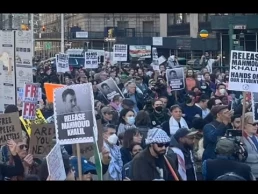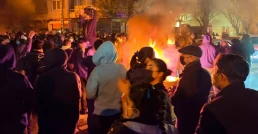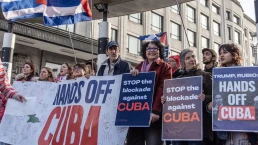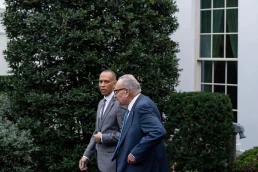While the Trump administration targets hundreds over their constitutionally protected right to political speech, Democratic leadership and influential media pundits have largely stayed quiet.
By Adam Johnson and Sarah Lazare, In These Times
President Trump’s unprecedented crackdown on constitutionally-protected speech has solicited crickets from key Democratic Party leaders and self-described “free speech” advocates in the U.S. media.
A review of public statements from influential pundits and Democratic Party leadership shows that while there has been a smattering of (heavily qualified) support for Mahmoud Khalil and other Palestine solidarity activists who are being deported or threatened with deportation, most have been muted as Trump continues his war on free speech. Particularly notable is the absence of meaningful criticism from major Democratic Party luminaries such as former Presidents Joe Biden and Barack Obama, former Secretary of State, former Democratic nominee for president — and Columbia lecturer — Hillary Clinton, none of whom have commented on the Khalil case or any of the other individuals the Trump administration is kidnapping off the streets.
The two most powerful Democrats in Congress – –Sen. Minority Leader Chuck Schumer (N.Y.) and House Minority Leader Rep. Hakeem Jeffries (N.Y.) issued tepid demands for Trump to “produce facts and evidence of criminal activity” after ICE disappeared Khalil. But neither has used their considerable influence to target the deportation regime, and there is no apparent coordinated messaging around Trump’s escalation. On March 29, Jeffries issued a follow up press release on his website saying, “Donald Trump and his House Republican enablers have weaponized immigration enforcement to aggressively target students in a manner that appears wildly inconsistent with the United States Constitution.” But Jeffries didn’t share the statement in any of his social media channels, or use his leadership position to rally other Democrats for any meaningful pushback.

By way of comparison, Schumer and Jeffries have made dozens of public comments, floor speeches, social media posts and helped hold congressional hearings on the Yemen-Signal chat controversy. Obviously, administration officials using unsecured channels to discuss sensitive war planning is objectively an important story (though not nearly as important as the war crimes being discussed). But effectively ending the First Amendment and kidnapping or deporting hundreds students for political speech will almost certainly have worse long-term effects. Yet all one is getting from leadership is box-checking statements of concern drowning in libelous condemnations of the very people being abducted. Before getting to his criticism of Trump in his March 11 statement, for example, Sen. Schumer not one, but twice, heavily implied Khalil was guilty of promoting anti-semitism and harassing and menacing Jewish students — a claim without a shred of evidence.
The response from the free speech crowd has been mixed to nakedly cowardly. PEN America and the ACLU have issued statements and filed lawsuits on behalf of the deported activists. But high-profile “free speech” advocates such as Bari Weiss, Jonathan Haidt, David Brooks, David Frum, John McWhorter, and Malcolm Gladwell have either remained silent or championed the arrests. A review of the signatories of the now-infamous 2020 Harper’s Letter shows that of those who could issue statements (those who are still alive and not retired from public life), only 24 percent who put their name on the letter defending “Open Debate” have come out in opposition to Trump’s war on campus free speech. Some, like Harvard’s Steven Pinker, have aggressively spoken out about Trump’s withdrawing of funding from higher education, but have been notably quiet on the kidnapping of international students for the supposed crime of political speech.
Recent Posts
Leading Papers Call For Destroying Iran To Save It
February 11, 2026
Take Action Now The opinion pages of the New York Times and Washington Post are offering facile humanitarian arguments for the US to escalate its…
Despite Marco Rubio’s Warnings, This is the Time to Go to Cuba in Solidarity Against the Latest U.S. Aggressions
February 10, 2026
Take Action Now When visiting Cuba, one can see quickly the terrible effects of the almost seven decades of the U.S. economic blockade of Cuba.By…
“Hands Off Cuba!”: Left Groups in Europe Mobilize Against U.S. Aggression
February 10, 2026
Take Action Now Hundreds demonstrated in Belgium in solidarity with Cuba as further mobilizations against US imperialism are planned across Europe.……
Democrats Propose Minor Reforms for ICE — and Record Funding
February 10, 2026
Take Action Now Congressional Democratic leaders are asking ICE to agree to reforms, promising to vote for $11 billion in funding for the agency if…




